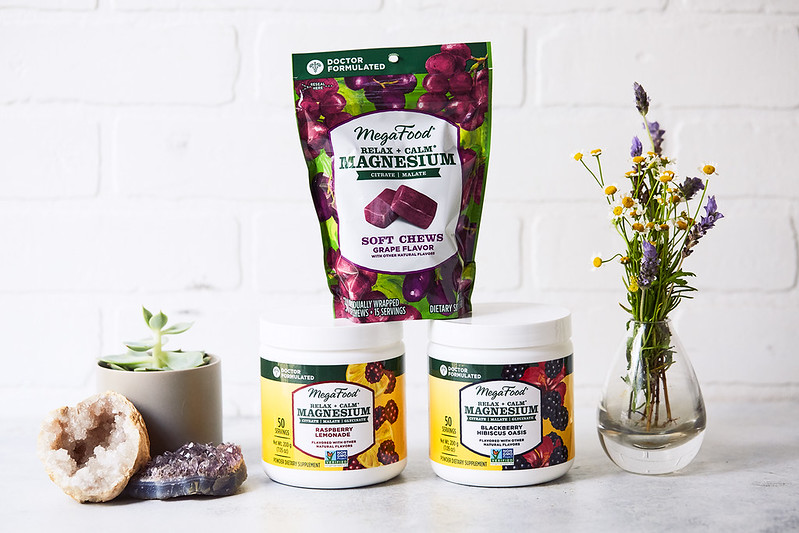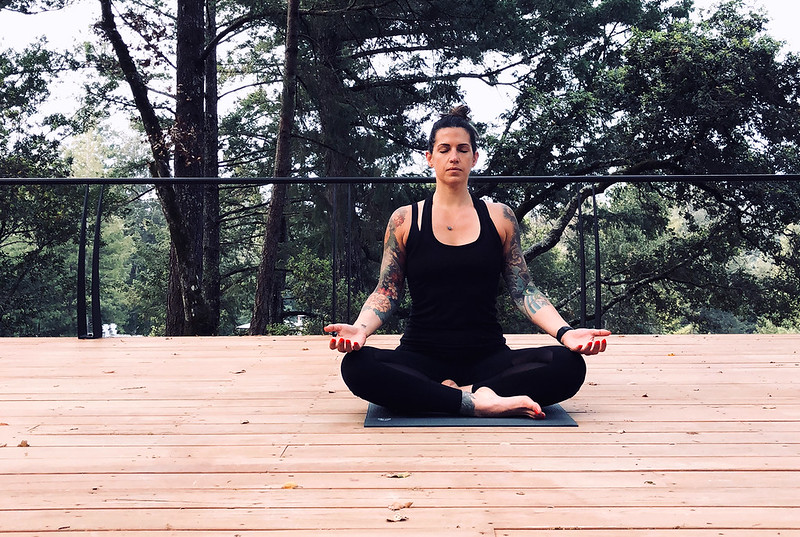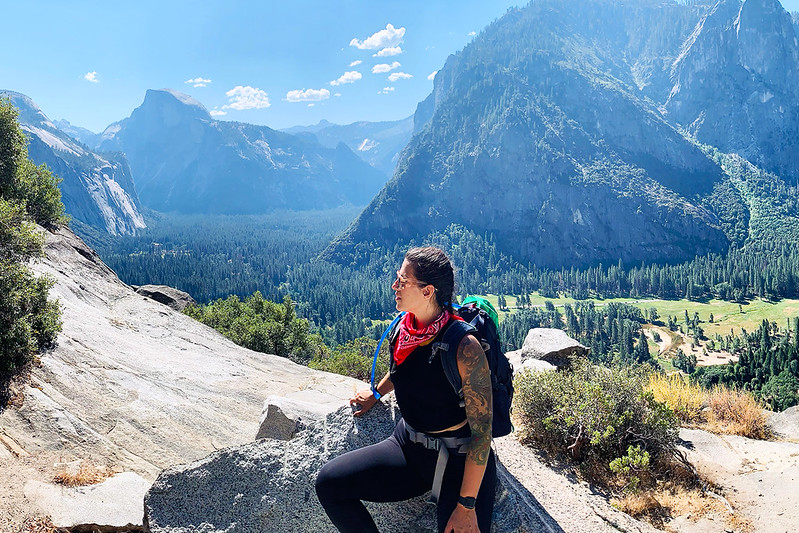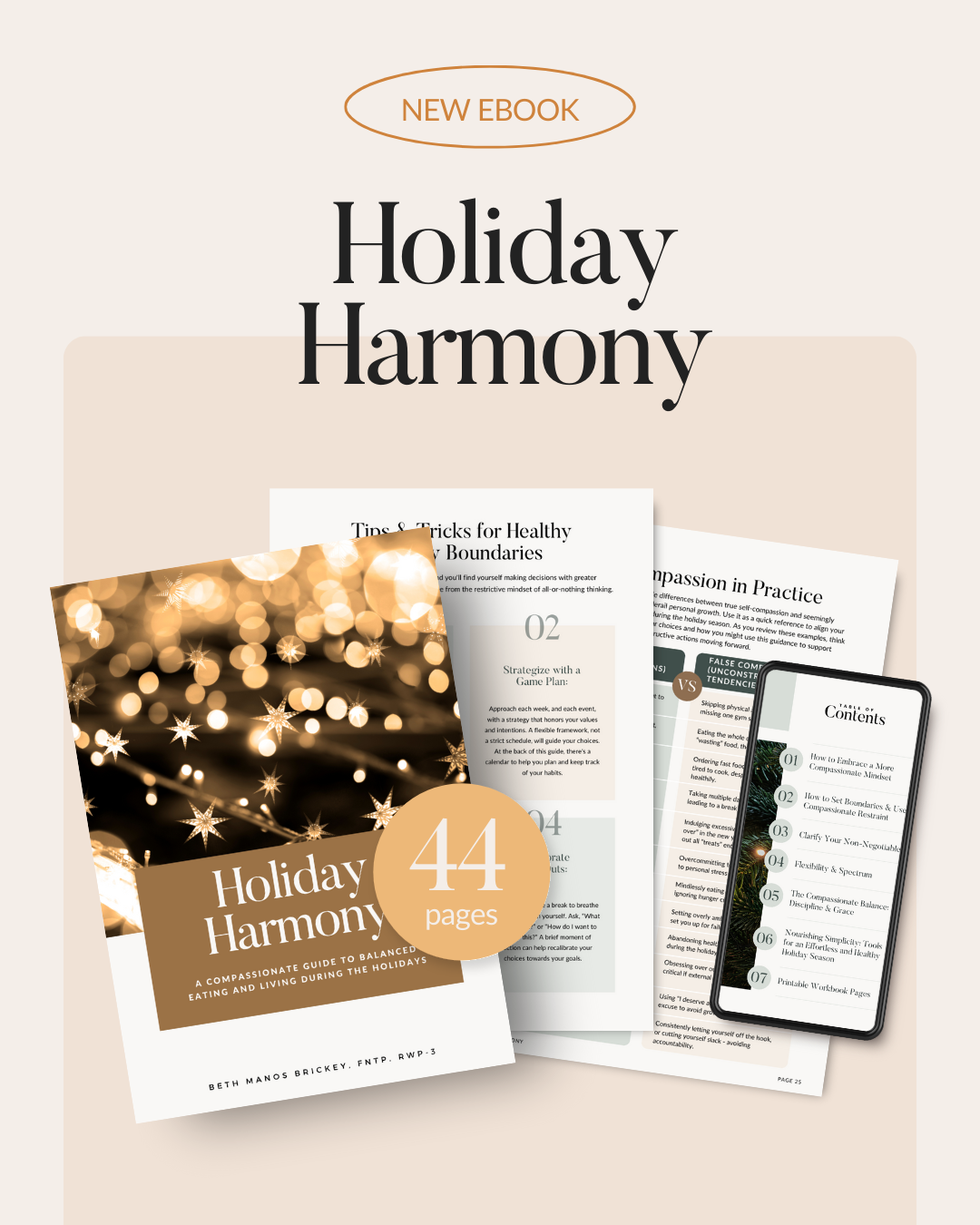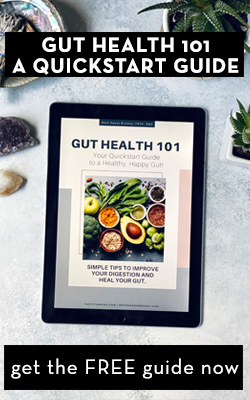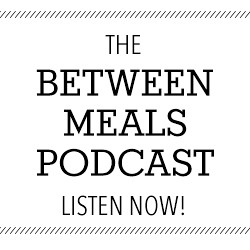This post was created in partnership with MegaFood, a company crafting premium supplements with real food and added nutrients. I am proud to work with brands that care about the health of its consumers and the planet. As always, all opinions, ideas and text are my own. Thanks for supporting the sponsors that allow me to create new and special content like this for Tasty Yummies.
There is no denying stress is part of the human experience and while stress may be an inevitable part of living, supporting the body in its stress resiliency and working on our response to stress doesn’t have to be a complicated undertaking.
Stress is pervasive, and as I teach all of my Nutritional Therapy clients, it isn’t just the typical mental and emotional life stressors we need to consider. Stress and our body’s response to stress can sneak in through blood sugar dysregulation, inflammation, circadian rhythm disruption, and so much more. What are we to do when stress surrounds us and we are desperate to relax and find peace and calm in our mind and body?
Many of the stressors we’re exposed to might be beyond our control; we can control our response to stress and bring a sense of calm to the mind and body to support our nervous system from being impacted by the stress.
Here are my top 5 tips to relax and calm your mind and body and to support a healthy response to stress:
1) Breathwork:
Targeted breathwork is a powerful, simple and very accessible tool that can support the body and the mind in feeling calmer, at ease and relaxed.
Deep belly breathing is the most simple and effective technique that can be implemented any time anywhere. By practicing conscious, mindful breathing you are encouraging your body to make the switch from the stress-driven sympathetic nervous system dominance (what we call “fight or flight mode”) into the calm parasympathetic nervous system state, also known as “rest and digest mode.” In order for the body and the mind to feel calm and relaxed, we need to be in parasympathetic mode. Try this simple breathwork practice to relax and calm your mind and body.
Deep belly breathing:
Place one hand over your belly and one hand over your heart. Before you change or alter anything about your breathing, notice first if much of your natural breath state is more present in your chest and ribcage, are your shoulders rising and your breaths more shallow? Now, bring your focus to the hand on your belly, close your eyes. Take a deep breath in through the nose, allow that inhale to fill your belly. Feel your belly swell into your hand. As you exhale, feel your belly fall away from your hand, exhale the breath out from the mouth with an audible sigh sound. Practice 5 rounds of deep breathing, recognizing how different it feels to move the breath beyond the ribcage. Continue to feel your belly rise and fall. Try to match the length of your exhales to the length of your inhales. Consider counting to 5 with every inhale and every exhale.
Use this practice any time you wish to bring a sense of calm to your mind and body. There is no more simple action you can take to calm yourself in moments of stress or unease.
You can also explore and experiment with box breathing, 4-7-8 breathing and other calming breath practices.
2) Include Magnesium:
Magnesium is an incredible, calming mineral to support the body in relaxation and to ease muscle tension.* Magnesium is one of my favorite minerals because it’s a mineral responsible for various fundamental processes in the body. As a highly needed mineral, it’s an important one to add in through food, and supplements.
There are many forms of magnesium; some are more absorbable and more usable than others. An easy way to include magnesium in your daily routine is through supplementation like the Relax + Calm* Magnesium Powders and Soft Chews from MegaFood. These new products help support muscle relaxation, ease muscle tension, and promote a sense of calm.*
The magnesium powders come in two delicious flavors and contain magnesium glycinate, citrate and malate – you can blend with water and drink on-the-go or make it part of another calming mindfulness practice you have added to your day.* I like to take a midday break, mix up this delicious elixir and enjoy some time outside in the sun.
If you prefer, MegaFood also has the Relax + Calm* Magnesium Soft Chews, a great option for those who don’t love to swallow pills or mix in a drink.
Like all MegaFood supplements, you can enjoy all of the new magnesium products without any extra stress,* as they are certified glyphosate residue-free, vegetarian, and gluten, soy and dairy-free.
You can add in transdermal magnesium, like sulfate, which would be Epsom salts. Try a calming epsom salt bath with a soothing or relaxing essential oil like lavender, ylang-ylang or bergamot.
For food sources of magnesium, it’s important to note that some research shows our body only absorbs about 30% to 40% of dietary magnesium (source). Focus on magnesium-rich foods you can include spinach, Swiss chard, pumpkin seeds, avocado, hemp seeds, dark chocolate, almonds, cashews, mackerel, banana or plantain.
3) Meditation:
It is no secret that meditation is revered by people worldwide for its powerful impact on the body and mind. Meditation can take on many different faces and in my opinion, there is no one right or wrong way to meditate; it’s simply about the act of creating space for mindfulness, an opportunity to create a state of awareness and to cultivate peace of mind. In a study published in 2013, researchers from John Hopkins University found general meditation programs helped ease psychological symptoms of depression, anxiety and pain related to stress.
There is an unending list of meditation styles. From guided or unguided and there is a long list of possible types of meditation, including Insight (vipassana) Meditation, Calming (samatha) Meditation, Mantra Meditation, Spiritual Meditation, Zen meditation, Transcendental Meditation, Chakra Meditation, Qiqong Meditation, Sound Bath Meditation, Movement Mediation and more.
I recommend trying out various styles until you find a practice that works for you and allows you to feel relaxed and at ease. Here are a few recorded meditations I have shared in the past:
You can also check out these apps for guided meditation practices: Calm, Insight Timer or Headspace
4) Consider reducing or avoiding stimulants:
Stimulants like caffeine and excessive amounts of refined sugar can increase physical symptoms of stress, tension and anxiety in the body. Both havebeen shown to stimulate the sympathetic nervous system, caffeine more directly, sugar by way of the glycemic regulation system (AKA blood sugar). When it comes to caffeine and sugar, these foods needn’t be villainized, considered “bad,” and black-listed forever. However, if your body and your mind are currently struggling to find peace and calm and you know you are under a significant amount of stress, you may want to consider reducing or eliminating foods containing these stimulants to support the body in relaxing.
If you are looking for tips should you decide to take a break, check out this post with five tips for your sugar detox and this post on why you may want to consider taking a break from caffeine.
5) Connection / Disconnection:
During times of stress and unease, it’s important to know when to connect to practices, activities and people that / who bring you joy and calm, and when to disconnect from things and people that / who contribute to your stress and unease. Cultivate awareness and notice the people and things that allow you to feel a sense of peace, create the space daily to include these things that positively support you. Recognize the things creating tension, physically and psychologically, and acknowledge the things you do have control over in your daily life.
Other options to connect and disconnect:
– get outside – take a walk, go on a hike, go to the beach or the park. Get out in nature, experience grounding and the sunshine, maybe some light exercise that will relax and soothe your mind and body.
– get a hammock or create a little sanctuary in your yard and enjoy time outside doing absolutely nothing; let the breeze blow in your hair and the sunshine warm your skin.
– read a book in the grass – take your shoes off and connect with the earth to experience a powerfully calming and soothing response from your body.
– turn off your devices in the evening hours and be completely present with your family or connect with someone who feels like family.
– take extended breaks from social media, a full day, a weekend or maybe even a week. Social media can be a powerful way to connect and it can also bring stress.
– recognize where stressful media, news, social media, etc. invade your life and create stress and unease. Control your consumption and consider avoiding, as needed.
Stress may be inevitable and sometimes out of your control, but how you navigate the stress, how you perceive it and the choices to mitigate the stress are entirely within your control. Bringing a sense of calm to your mind and body may take as little as 5 to 10 extra minutes per day, but the payoff is priceless.
Additional tips for managing stress and calming your mind and body:
- prioritize quality sleep
- support balanced blood sugar
- prioritize anti-inflammatory foods
- set healthy boundaries with people in your life who contribute to your stress and anxiety levels
- tapping
- reframing your response to stress
- therapy / counseling
How do you cultivate the space to bring relaxation + calm to your life? What practices, foods or supplements have you found to be most beneficial?
Last thing – get 20% off the new magnesium powders and / or soft chews from MegaFood using my code, BETH20 at megafood.com.
*These statements have not been evaluated by the Food and Drug Administration. This product is not intended to diagnose, treat, cure or prevent any disease.

